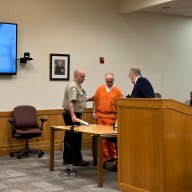In Theresa Rebeck’s “Seminar,” four aspiring authors lay out $5,000 apiece to receive feedback from a literary luminary. One of those would-be writers is the reserved and romantic Martin, played by Hamish Linklater. Though most people know the refreshingly unpretentious actor from “The New Adventures of Old Christine,” Linklater actually comes from a theatrical background. He spoke with us about where he’s come from, where he’s going and what it’s like to share the stage each night with Alan Rickman – who happens to also be a friend and mentor in real life.
So what’s your background, how did you start out?
I was born in New York but I was raised in Western Massachusetts. … I went to Amherst College eventually, for one year, but I dropped out and moved to the city to be an actor. … Then I went to work — well, I went to being unemployed.
But you’d already been doing Shakespeare?
My mom had started a theater company called Shakespeare & Company in the Berkshires. I was like 2 when that was founded, so they would throw me into any baby roles that were available, kiddy roles. So I really grew up onstage there.
What’s your favorite Shakespeare role?
I got to play Hamlet twice. Once when I was 27 and once when I was 30. And I can’t wait for another shot with that. I was a really angry twentysomething when I did it the first time. And [the second time] I’d just become a father, with a 3-week-old baby [Lucinda Rose] when we started rehearsal.
You tend play characters who are pitted against strong female characters – is that your niche?
Well my mother is a very strong female character. She’s a teacher and Shakespeare expert and voice expert. So she’s definitely a bossy lady I’m used to.
And you often play against Lily Rabe, who starred with you in last year’s “The Merchant of Venice” before “Seminar.”
And we actually did a movie together were we played husband and wife [“Beyond Redemption,” not yet released]. I get cast opposite her because she’s so tall. That sort of keeps me employed. But she gives so much, and she puts so much out there, and it’s like you’re always on your toes. And that’s where you want to be. So she’s a really good sparring partner. … We’re always trying to figure out what’s the next thing we can do, “What other play needs two tall people?” It’s really rare that you work with the same actors over and over again, but when you do have the chance … the process is faster and deeper and more immediate.
How did you get involved in “Seminar”?
Theresa Rebeck and [director] Sam Gold asked me to do it. Alan was doing it, and they needed someone tall. … Sam and I had been trying to do things a few times before and it hadn’t worked out. This was the third time we tried, and it clearly did work out.
In the play, your character is extremely reluctant to show his work. Do you share similar sentiments of stage fright or fear of criticism?
You look for parts that are going to ask more of you. I think that’s what I really related to in the character, is that I always feel like I haven’t really shown myself. … But if you’re an actor, you’re an extrovert. So you can’t really just hide out in your apartment in Queens. You’ve gotta go audition, you’ve gotta do all that. But there’s definitely that feeling of not being seen or not wanting to be seen, of being scared. I really try not to read [reviews], because good or bad they f— you up.
He’s also quite the lady’s man. Do you share that attribute with him?
No. No. No. Part of his journey through the play is that he’s not only stunted creatively, but he’s also stunted emotionally. He misses this relationship that he should have with Kate [Lily Rabe] all the way through, and Izzy [Hettiene Park], the other woman, claims him. … He has this intellectual relationship with the teacher and these emotional relationships [with Kate and Izzy] that need to open him so he can become the writer he’s meant to be.
What about the starving artist role? Is that too far in your past to relate?
That’s his choice to a certain extent. When I moved to New York I was 19 and it took me about six months to get my equity card, to get my first paid gig. I was the checkout guy at the drama bookstore and I filed death certificates at a temp agency and I put up signs and I worked for my dad painting apartments. I was like, “This great, I’m really gaining life experience!” But I was miserable. Life experience sucks. Theater experience is great. I’m really glad not to be doing that anymore. … But who knows, I’m sure I’ll be sending in my application to the drama bookstore at the end of [“Seminar”].
What about your daughter [now 5]? Are you encouraging her to go into the real world or into the theater?
Because I grew up in theater, I think it’s a wonderful world. It’s my family and my home. … And if she wanted to go in there, it would be wonderful. Anywhere she’s happy.
What about writing?
Writing is really hard! Just the solitariness of that takes a certain personality. But if she had that kind of personality where she could just be by herself with her words, then that’s an amazingly strong kid I’ll have raised, and I’ll be very proud.
How is it working with Alan Rickman?
You really want to pay attention. I mean, he demands attention and you want to give it to him. He has some really long speeches that he gives to me directly, and I’m really glad that it’s him giving them because otherwise my mind might wander. But he has these laser beam eyes. And the performance is different every night, and so it holds your attention, I’m really grateful. And if my mind does wander, he’s certain to let me know it.
Does the relationship with the audience change, does he get a lot of fans?
No, it’s great. He has a wonderful, young demographic thanks to the “Harry Potter” movies. That’s really fun to play to. The best theater to work in is the park, because the tickets are free and people pay to see the play with their time, not with their money. Here, the tickets are $100, and that winnows out a certain demographic. And it can make for a more staid audience. … Thank God for Alan’s star power, because it really makes it a light evening of work when the audience is enthusiastic and excited to be there. When they haven’t paid anything and they get to see Al Pacino, that’s going to be an excited audience too. It has its advantage, working with stars.
Had you met him before?
He’d worked with my mom, she was his voice teacher, so we had a relationship before. And he’s just great, he’s lovely. And I do a little but of writing myself, and I think he’s going to be doing a reading of a play I wrote in April, a benefit reading. The play is called “The Vandal.” … Just like in the play, I’ve given it to him and his notes are copious and his response is completely thorough — much nicer than onstage, but certainly just as honest and direct.
And what else is coming up for you?
I’m going back to Los Angeles when this is done, and I’ve been doing some playwriting. And then yeah, I guess I’ll have to make some money. I have some movies coming out, so I’ll get to go to fun places and stay in hotels. That’s really work, but it’s not really work.
















